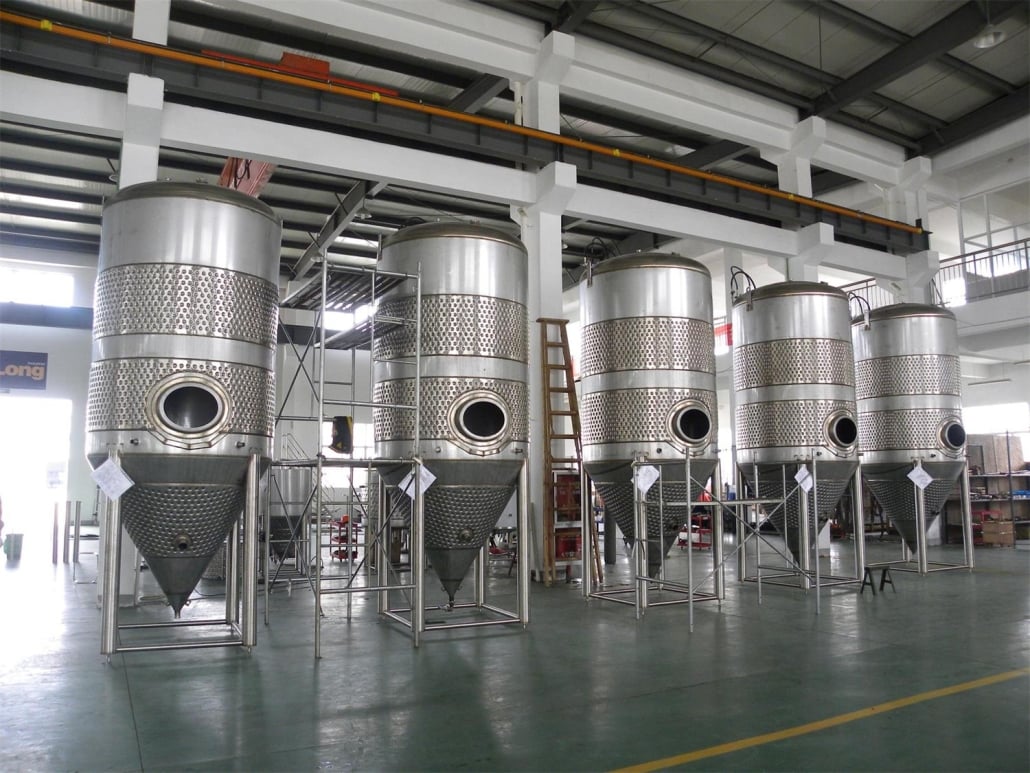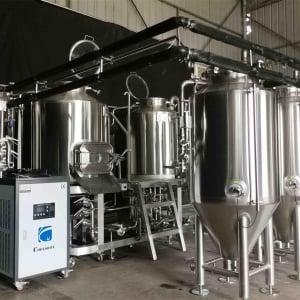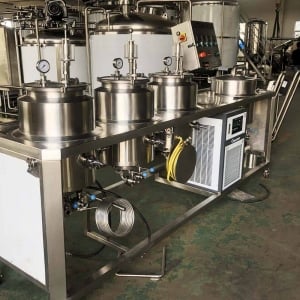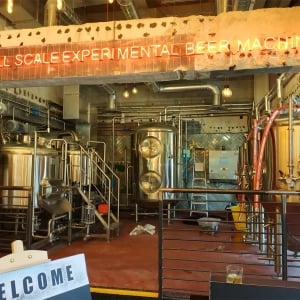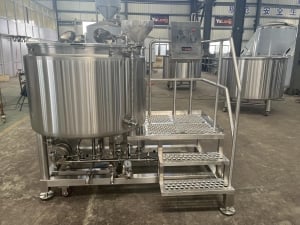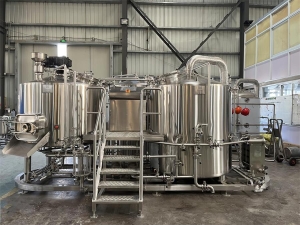Table of Contents
ToggleIntroduction
Beer has been a beloved beverage for centuries, and with the rising popularity of craft breweries, the demand for high-quality commercial brewery equipment is soaring. Whether you are starting a new brewery or upgrading your existing one, investing in the right equipment is crucial for success. This article will guide you through the ins and outs of commercial brewery equipment, helping you make informed decisions for your brewing venture.
What is Commercial Brewery Equipment?
Before diving into the specifics, let’s understand what commercial brewery equipment entails. It encompasses a wide range of machinery and tools used in the brewing process, from mashing and fermenting to packaging and quality control. These specialized equipment pieces are designed to handle large-scale production and ensure consistency in flavor, aroma, and quality.
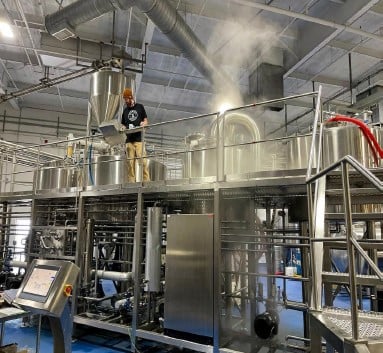
Types of Commercial Brewery Equipment
Brewing Kettles
The brewing kettle is the heart of any brewery. It’s where the wort is produced through the mashing and boiling of malt and hops. Selecting the right kettle size and configuration is vital, as it sets the foundation for the entire brewing process.
Fermentation Tanks
Fermentation tanks are where the magic happens – yeast converts sugars into alcohol, resulting in beer. These tanks come in various shapes and sizes, and their design can influence the fermentation process and the beer’s characteristics.
Mash Tuns
Mash tuns play a crucial role in the mashing process, extracting fermentable sugars from the grains. An efficient mash tun ensures a successful conversion, leading to better beer quality.
Boilers
Boilers are responsible for heating the brewing water and steam required in the brewing process. Choosing energy-efficient boilers can significantly impact overall production costs.
Cooling Systems
Effective cooling systems are essential to control the fermentation temperature and maintain optimal conditions for yeast activity.
Filtration Systems
Filtration systems help clarify the beer by removing unwanted solids, resulting in a clear and visually appealing product.
Cleaning Equipment
Proper cleaning and sanitization are critical in breweries to prevent contamination and ensure the production of consistent, safe, and high-quality beer.
Packaging and Bottling Equipment
Packaging equipment plays a vital role in ensuring beer is properly filled, sealed, and labeled, ready for distribution and consumption.
Quality Control Tools
Quality control tools, such as hydrometers, refractometers, and spectrophotometers, help brewers assess and maintain the beer’s quality throughout the brewing process.
Key Factors to Consider When Choosing Commercial Brewery Equipment
Selecting the right equipment for your brewery can be overwhelming. Here are some crucial factors to consider before making a purchase:
Production Capacity
Understanding your brewery’s production needs and growth projections will help you choose equipment that meets your current and future demands.
Space and Layout
Optimize your brewery’s layout by choosing equipment that fits well within the available space while allowing smooth workflow and expansion opportunities.
Efficiency and Automation
Automated equipment can streamline the brewing process, enhance efficiency, and reduce the risk of human errors.
Budget and Cost
Investing in brewery equipment is a significant financial commitment. Carefully balance your budget while keeping an eye on long-term returns and benefits.
Quality and Durability
High-quality equipment might come with a higher price tag but can ensure reliability, longevity, and better beer quality.
Benefits of Using High-Quality Brewery Equipment
Investing in top-notch brewery equipment can lead to several advantages for your brewing business:
- Consistency: High-quality equipment ensures consistent brewing processes, leading to a uniform and predictable beer output.
- Time and Cost Savings: Efficient equipment reduces production time and lowers operational costs.
- Improved Product Quality: Better equipment translates to better beer quality, pleasing customers and building brand reputation.
- Safety and Hygiene: Reliable equipment promotes safety and maintains high sanitation standards.
- Innovation and Creativity: Some advanced equipment allows for experimentation with new beer styles and recipes.
Maintenance and Care of Commercial Brewery Equipment
Regular maintenance and care are essential to keep your brewery equipment in peak condition:
Regular Cleaning and Sanitization
Thoroughly clean and sanitize all equipment after each batch to prevent contamination and off-flavors.
Preventive Maintenance
Implement a proactive maintenance schedule to identify and address potential issues before they escalate.
Repairs and Troubleshooting
Promptly address any equipment malfunctions or breakdowns to minimize downtime and production losses.

Trends in Commercial Brewery Equipment
Staying updated with brewing industry trends can give your brewery a competitive edge:
Sustainable Brewing Equipment
Many breweries are adopting eco-friendly equipment and practices to reduce their environmental impact.
Smart and IoT-Enabled Brewing Systems
Internet of Things (IoT) technology is transforming breweries by offering real-time monitoring and control capabilities.
Modular and Customizable Equipment
Breweries are embracing modular equipment setups that allow for flexibility and easy expansion.
Buying Guide: Finding the Right Commercial Brewery Equipment Supplier
Choosing the right supplier is crucial in ensuring you get the best brewery equipment for your needs:
Research and References
Do thorough research, read reviews, and seek recommendations from fellow brewers.
Reviews and Testimonials
Check customer reviews and testimonials to gauge the supplier’s reputation and customer satisfaction.
Customization Options
Consider suppliers who offer customized equipment solutions tailored to your brewery’s requirements.
Technical Support and Training
Choose a supplier that provides excellent technical support and training for your staff.
Warranty and After
Select a supplier that offers a comprehensive warranty and after-sales services, including maintenance, repairs, and spare parts availability.
Conclusion
Investing in commercial brewery equipment is a significant step towards building a successful and thriving brewery business. By understanding the different types of equipment available and considering key factors like production capacity, efficiency, and quality, you can make well-informed decisions for your brewery. High-quality equipment not only ensures consistency and cost savings but also contributes to better beer quality and customer satisfaction. Stay updated with industry trends, such as sustainable and IoT-enabled equipment, to remain competitive in the evolving brewing landscape.
FAQs
What is the importance of commercial brewery equipment?Commercial brewery equipment is essential for large-scale beer production, ensuring consistency, efficiency, and quality throughout the brewing process.
How do I choose the right brewing kettle size for my brewery?Consider your production capacity and growth projections to select a brewing kettle that meets your current and future demands.
What are the benefits of investing in automated brewery equipment?Automated equipment streamlines the brewing process, enhances efficiency, reduces human errors, and ultimately saves time and costs.
How can I maintain my commercial brewery equipment?Regular cleaning, sanitization, and preventive maintenance are crucial for keeping brewery equipment in top condition and prolonging its lifespan.
What are the latest trends in commercial brewery equipment?Sustainable brewing equipment, smart IoT-enabled systems, and modular, customizable setups are some of the latest trends in the brewing industry.

